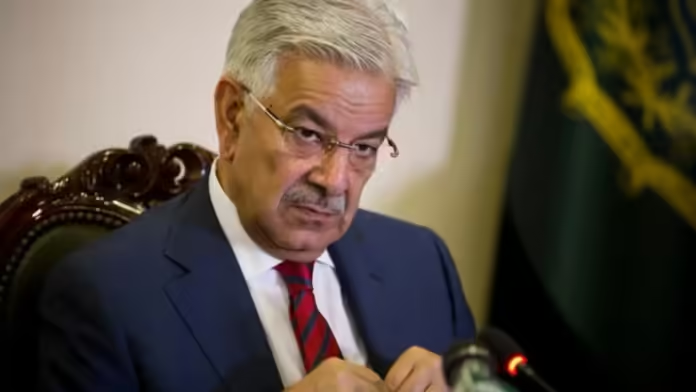Pakistan Defense Minister Khawaja Asif warns that Pak-Afghan border tensions still remain
Relationships between Pakistan and Afghanistan have again neared a boiling point with Defense Minister Khawaja Asif declaring that relations between Islamabad and Kabul have completely collapsed. The volatile mix comes in the wake of Afghanistan’s unprovoked aggression on the Pak-Afghan border — an act which not only re-ignited military tensions but also put regional stability at risk.
Khawaja Asif revealed that “there are no direct or indirect relations with Afghanistan.” His words reflected the growing irritation in Pakistan’s leadership following repeated border incursions and hostile behavior by the Afghan side.
A Fragile Calm After Intense Clashes
The frontier is currently in a state of “stagnation” with no continuous fighting, Asif added. But he cautioned that the atmosphere is “tense” and the war could erupt at any moment. “We must leave open the possibility of a return to hostilities,” he added, pointing out the precariousness of the situation.
The announcement by the Defense Minister follows one of the bloodiest cross-border exchanges in recent history. In the wee hours of October 11-12, 2025, Afghanistan’s Taliban forces — aided by India-supported terror group Fitna al-Khawarij — launched unprovoked attacks on Pakistani positions.
Pakistan’s Retaliation: A Firm and Measured Response
The Pakistan Army’s Inter-Services Public Relations (ISPR) verified that Pakistani forces reacted best and at once to the aggression. The ISPR, in a report, stated that 23 Pakistani soldiers died as martyrs and 29 others injured while defending the borders of the country. Due to the resultant unfortunate casualties, Pakistani soldiers fought with courage, demonstrating unmatched bravery and discipline on the battlefield.
In response, the Pakistan Army’s counteroffensive gave a crushing blow to the attackers. “More than 200 Afghan Taliban and other terrorists were killed,” the ISPR revealed, further stating that “21 Afghan positions were captured” during the operation.
Significantly, the ISPR pointed out that all precautionary steps were taken to avoid civilian casualties in order to show Pakistan’s commitment to humane behavior even in the midst of war.
A Breakdown in Diplomatic Ties
The return to conflict is a disquieting page in Pak-Afghan history. Khawaja Asif’s admission that “there are no relations with Afghanistan” is a stark reflection of diplomatic failure. Pakistan has, over decades, advocated regional peace and cooperation, providing humanitarian as well as economic assistance to Afghanistan. Recent actions by the Taliban regime — including harbouring anti-Pakistan troops — have eroded confidence.
Islamabad unflinching: Pakistan will not endure threats to its sovereignty. The Defense Minister reaffirmed that the military is ready to respond to any future aggression with full strength if need be.
Regional Implications and the Road Ahead
The escalating Pak-Afghan border tensions not only risk bilateral relations but also jeopardize the larger region seriously. Experts are of the view that renewed violence may cause instability across South Asia, disrupt trade corridors, and embolden militant networks along the border.
Although the two nations have a robust cultural and historical affinity, their current path is towards confrontation, not collaboration. Pakistan, nonetheless, continues to be attractive for restraint and responsible actions by Kabul, urging it to desist from allowing its ground to become an objective against neighboring states.
Even as the future of the talks is unknown, the world holds its breath. The threat of new hostilities looms large, and as diplomacy is stuck in ice, hopes for peace seem increasingly a distant mirage.
Standing Firm Amid Uncertainty
Pakistan’s message remains clear as crystal — its borders are sacrosanct, and the martyrs’ sacrifices of its soldiers will never be in vain. With tensions still simmering on the Pak-Afghan border, the government and the armed forces remain resolute in their commitment to safeguard national sovereignty while striving for long-term stability through peace and mutual respect.
The coming days will be decisive in establishing whether the precarious peace prevails — or if the Pak-Afghan border once more becomes a hotbed of military conflict.
Follow Pakistan Updates for more news and updates.




